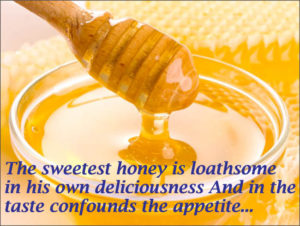 “… The sweetest honey
“… The sweetest honey
Is loathsome in his own deliciousness,
And in the taste confounds the appetite
(Romeo and Juliet act 2, sc. 6)
Comments. This is for readers of this blog and website who may have a weakness for sugar and sweet things in general. Although, for the sake of accuracy, honey here is a metaphor for excess in love.
History and literature are filled with general advice on food and nutrition. Almost everything we eat or drink has at some time or other been denounced as illegal, immoral, irreligious or nasty. For example, according to Thomas Fuller (1608-1661) “He was very valiant man who first adventured on eating on oysters.” (History of the Worthies in England). And even the unassuming lettuce has been accuse to obstruct love-making, “Lettyse doth extinct veneryous actes.” Andew Boorde (1490-1549 – “A Dyetary of Helth”).
The lines are effective in any situation when you feel that you are asked to repeat something (a speech, a trick etc.) that may lose its gleam or originality by repetition.
But returning to sweet and sugar and extracting from one source of related information (mercola.com) I read:
Is sugar a sweet old friend that is secretly plotting your demise? There is a vast sea of research suggesting that it is. Science has now shown us, beyond any shadow of a doubt, that sugar in your food, in all its myriad of forms, is taking a devastating toll on your health.
The single largest source of calories for Americans comes from sugar—specifically high fructose corn syrup. Just take a look at the sugar consumption trends of the past 300 years:
In 1700, the average person consumed about 4 pounds of sugar per year.
In 1800, the average person consumed about 18 pounds of sugar per year.
In 1900, individual consumption had risen to 90 pounds of sugar per year.
In 2009, more than 50 percent of all Americans consume one-half pound of sugar PER DAY—translating to a whopping 180 pounds of sugar per year!
As it often happens in medicine, opinions vary among the learned. Is sugar bad for diabetes? Here is one opinion, that seems to run counter to common notions. “The myth that sugar causes diabetes is commonly accepted by many people. Research has shown that it isn’t true. Eating sugar has nothing to do with developing type 1 diabetes.The biggest dietary risk factor for developing type 2 diabetes is simply eating too much and being overweight — your body doesn’t care if the extra food comes from cookies or beef, it is gaining weight that is the culprit.” (American Diabetes Association.”
You may look at the page describing the book “Your Daily Shakespeare”, 1387 pages filled choc-a-block with over 10,000 situations you may find yourself in or involved with, calling for the perfect Shakespearean repartee that will get you on the stage or at least out of the water – besides making a winner of any verbal contest. The analytical index is structured so that you can quickly select the best words that fit the situation. And if you like this website why not subscribe (see last menu item to the right)? You will get automatically any new blog as well as any other information and novelty that will be forthcoming, including a system to effortlessly (yes) remember hundreds of Shakespearean quotes by heart while having fun in the process. You can also chat with me – please go to the chat-page. And I promise, no sales calls, trade leads, venomous schemes, hidden plots, Machiavellian conspiracies, commercial ploys, psychological tricks, leads exchanges, barter proposals, suggestions or offers of any kind imaginable (and unimaginable).
In the play. Romeo is on pins and needles at Fr. Lawrence’s cell, waiting for Juliet’s arrival so that the wedding can be celebrated. Fr. Lawrence attempts to give Romeo some words of advice.
Image Source: http://www.suebee.com/honey/
